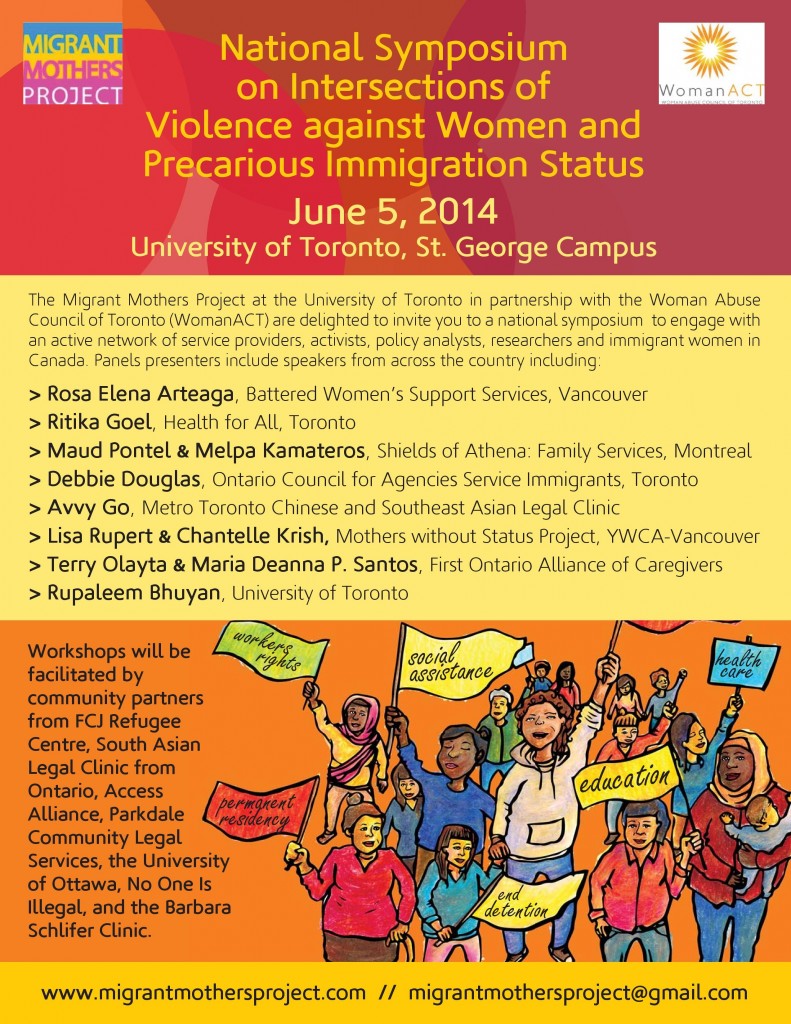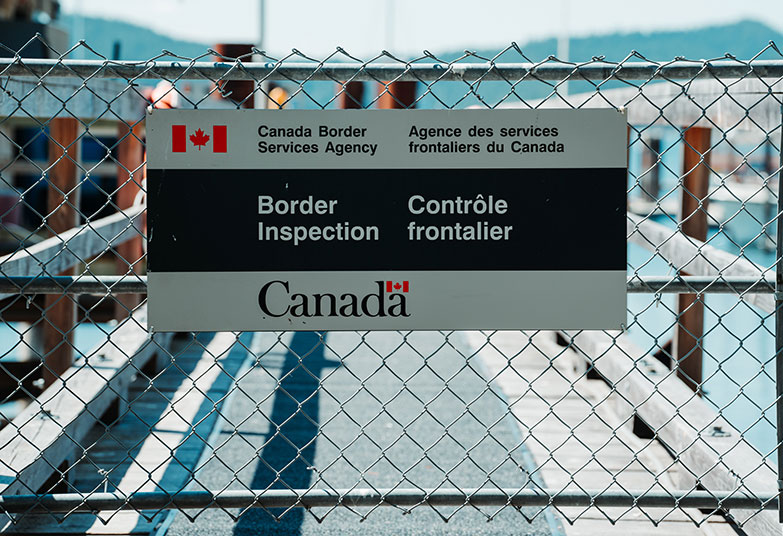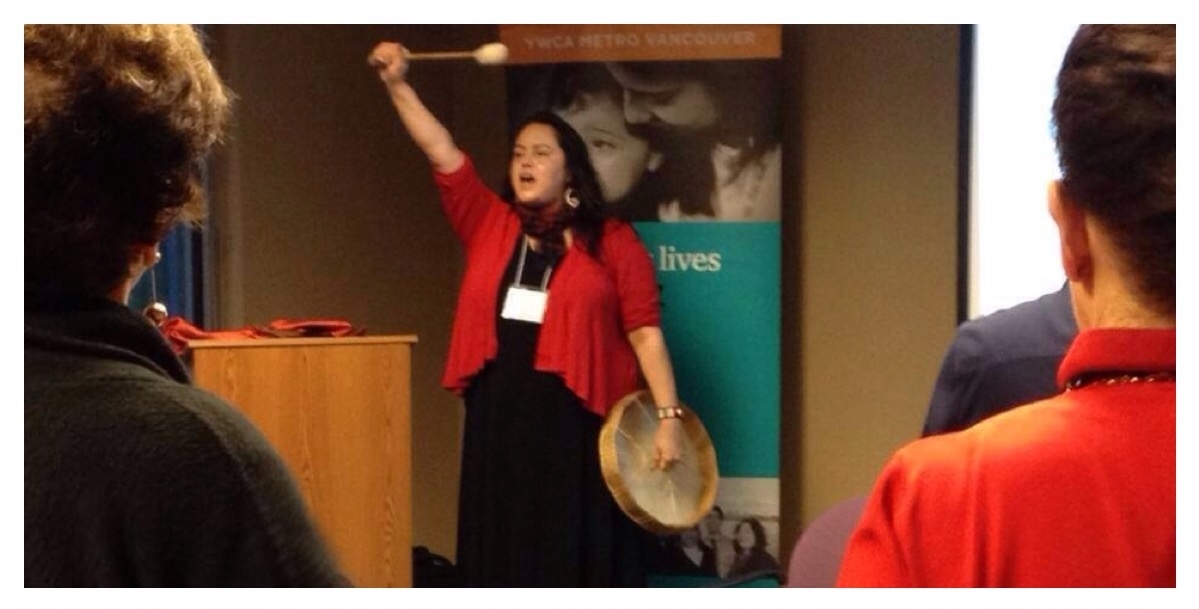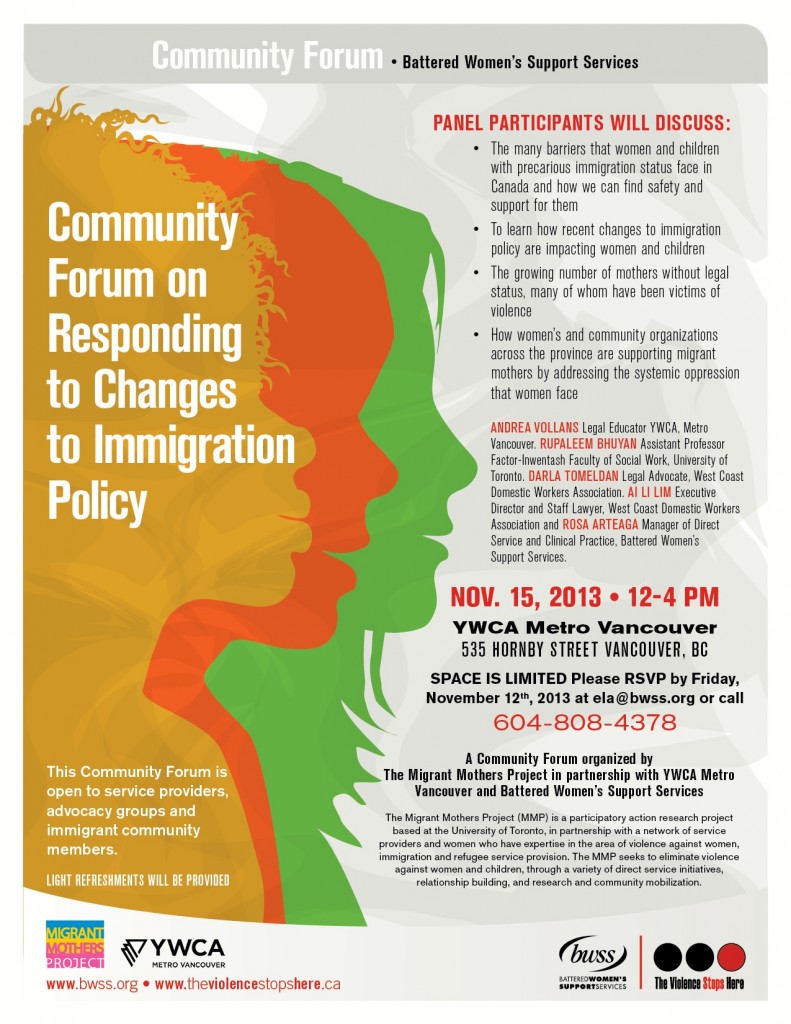Jul 4, 2011 | Battered Women's Support Services
Women’s Worlds 2011
Breaking the Cycles
of Violence Against Women
The first Women’s Worlds Congress was held in 1981 at Haifa University. Billed as the first world-wide inter-disciplinary gathering to focus on research pertaining to women’s issues open to researchers and activists. Taking place every three years in different parts of the world, Ottawa-Gatineau is the location of the 11th Women’s World, this year a global convergence of 1,600 women from July 3 to July 7 to examine what it means for women to live in a globalized world and Battered Women’s Support Services is there.
Today’s theme, Breaking Cycles discussed during the morning plenary spoke to us, well, Andrea Smith, spoke to our collective spirit of activism. Andrea Smith, one or our favourite feminist thinkers and anti-violence activists from the Cherokee nation, Andrea has garnered international respect for her advocacy on violence against women of colour, specifically Native American women. Co-founder of “INCITE! Women of Color Against Violence“, Andrea currently teaches in the Department of Media and Cultural Studies at the University of California, Riverside.
“…the government informed us yesterday that they are going to fix the problem of violence against Indigenous women…To do that they’d have to dismantle themselves” said Andrea and her words reminded us of the day previously when Status of Women Canada Minister Rona Ambrose, was booed during her welcoming address. Imagine that, the Minister of the Status of Women Canada, the primary funder of Women’s Worlds 2011 was booed. A revealing moment where it was clear that women have watched the dismantling of women’s equality in Canada for several years now. As we wrote on Mother’s Day 2011:
In 2006, Canada placed 14th out of 115 countries in terms of the World Forum’s “gender-gap index” – a complex calculation that takes account of wages, education, health and political power. In 2009, Canada had slipped to 25th place. Further, the phrase “gender equality” has been eliminated from the mandate of Canada’s primary institution responsible for gender equality in Canada: Status of Women; and while the word equality was re-introduced to the mandate, the spirit of equality has not been re-established. With the closure of twelve of sixteen Status of Women offices we are coming from behind in our efforts now to redress and achieve equality.
The current situation, sees Canada facing a national tragedy of 582 missing and murdered Aboriginal Women and eliminating funding to Sisters In Spirit. Women are facing proposed changes to Immigration where Sponsorship conditions would jeopardize Immigrant women’s safety and women fleeing to Canada due to Gender Persecution. Over the years we have witnessed the dismantling of the social safety net that would assist to level the playing field for women as represented in this List of Women’s Organizations That Have Had Funding Cut by the Federal Government. And don’t get us started about federal, territorial, provincial Justice Ministers and their funding decisions related to missing and murdered Indigenous women.
And it is within this challenging context that we do our work at Battered Women’s Support Services, where last year we responded to over 9,500 direct service requests. When we went to Women’s Worlds 2011 we went to say that violence against women is the most pressing social issue of our time. We went to Women’s Worlds 2011 to ask and answer the question what would it take to end violence against women?
Rosa Elena Arteaga (below) at the registration table on Sunday
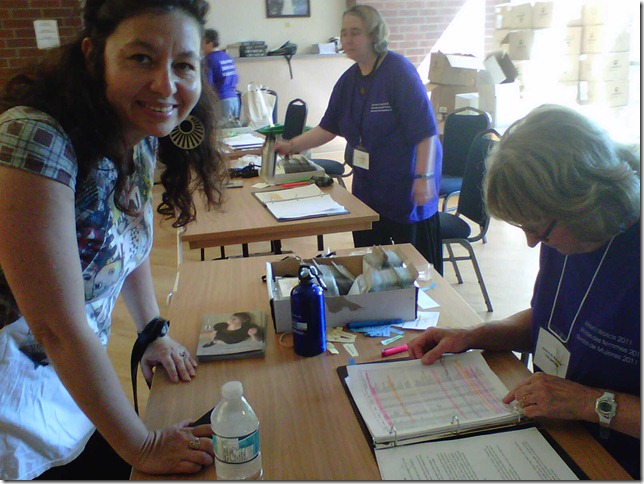
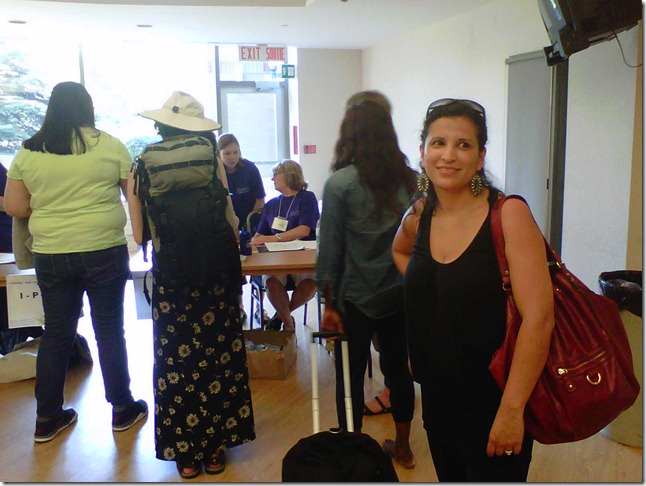
Andrea Canales (above) lining up to register for Women’s Worlds 2011 on Sunday
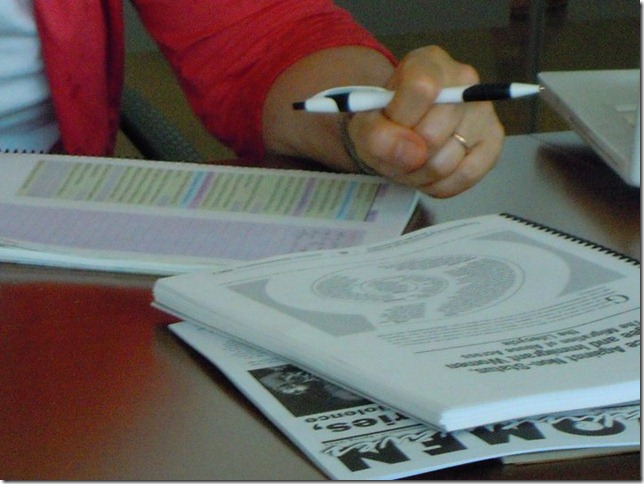
At our Vancouver office, we about 25% of the women who access our services are Aboriginal women and about 52% are Non Status, Refugee or Immigrant Women (NSRIW). In 2006, 51% of Vancouver’s total population identified as Immigrant and increase from 49% in 2001 and 44.8% in 1996 (City of Vancouver, 2009). The immigration of racialized people from “developing” countries is regulated and influenced by the historical development of Canada as a colonized capitalist country. Principally, the entry of poor and racialized Immigrants has been determined by Canadian’s labour need. The class and racial bias of the history of Canada can be clearly shown through its immigration policies. Poor people and racialized people are only allowed into Canada to fulfill the country’s needs for cheap labour. For more about immigration and violence against women see our manual.
Our presentation today at Women’s World 2011 was to name and take on the various systems of oppression that persist as cycles around the world, colonialism, patriarchy, and capitalism that grind down in the individual lives of women who access our services everyday that trace a woman through her life cycle as illustrated by Spiral of Gender Violence and to provide practical tools for front-line workers to support women who are living with violence.
Spiral of Gender Violence
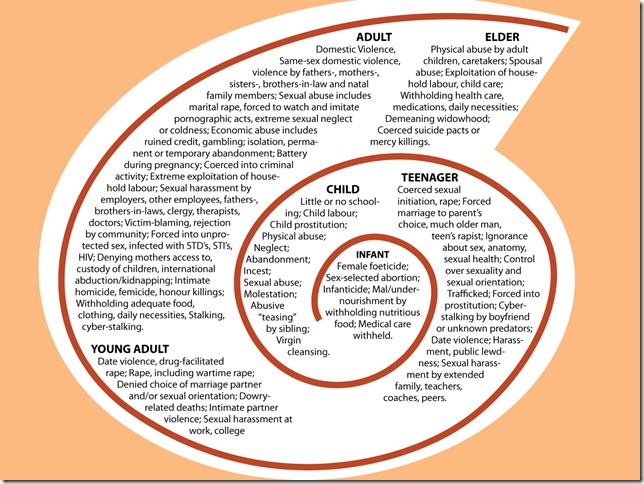 The Lifetime Spiral is designed by Asian & Pacific Islander Institute on Domestic Violence (2007)
The Lifetime Spiral is designed by Asian & Pacific Islander Institute on Domestic Violence (2007)
Gender oppression follows girls and women through infancy, childhood, adolescence, adulthood and as elders. Violence against women in intimate relationships is one of the many forms of violence against women and it is experienced in the context of additional oppressions based on colonialization, migration, immigration/refugee status, race, ethnicity, age, type of labour performed, access to/level of education, class, ability/disability and sexual orientation. We illustrate the layers and barriers experienced by women through our version of the power and control wheel for Immigrant and Refugee women.
Immigrant and Refugee Power and Control Wheel
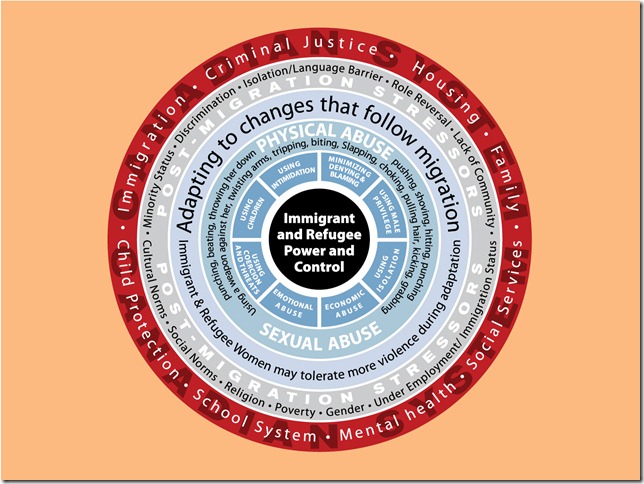
We recognize that it is of critical importance to identify the historic, legal, attitudinal and behavioural discrimination women experience that is embedded in mainstream Canadian culture and within Immigrant communities. Women internalize our oppression in order to make sense of the our family, our community and the world around us. Internalized oppression is one reason for the following graph illustrating percentages of women aged 15-49 who think that a husband/partner is justified in hitting or beating his wife/partner:

We had an incredible turn out for our presentation on Empowering Non Status, Refugee, and Immigrant Women, today. And we are honoured to contribute to Women’s Worlds 2011, the largest ever feminist gathering in Canadian history. Women from all over the world came together to learn and enhance their knowledge violence against women, both in general and specifically on how to support and empower NSRIW, from a women-centred, an anti-oppression, feminist perspective that comes from a desire to end oppression at a personal and social level.
This is Rosa Elena Arteaga, front-line worker at Battered Women’s Support Services and she led the presentation with Andrea Canales, front-line worker, behind the camera.
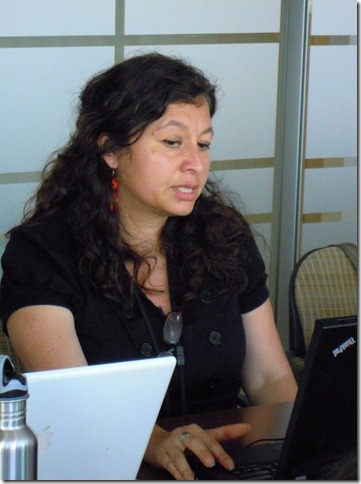
Our approach at Battered Women’s Support Services is to address the individual, relational, legal, community and society factors. We focus on raising awareness about the complex prevalence of violence against women and the damaging impact of intimate partner violence on Non-status, Refugee and Immigrant women, their children, their family and their community and through that we are identifying the root causes of violence the various tactics of power and control, the devaluation of women, the lack of accountability of men who use abuse and violence, and the complicity of communities both mainstream and Immigrant. Here’s our recent blog post on The Role of Men in Ending Violence Against Women from our presentation at the Canadian Council For Refugees Spring Consultation 2011 held in Hamilton, Ontario.
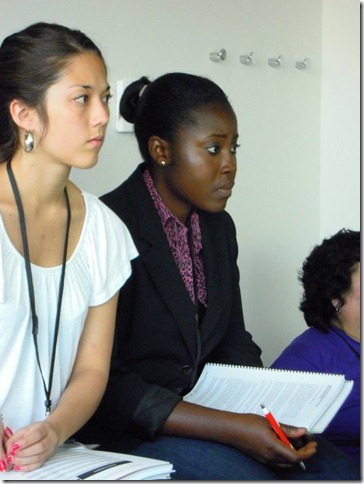
Participants, today, shared that they were thrilled with BWSS emphasis on advocacy work, approach and practices. Print resources were disseminated among all of the participants who expressed a deep appreciation for all of the work accomplish thus far. Women commented on the difficulty of doing this work and of feeling validated to have an organization leading the way in supporting NSRIW. Participants were impressed on the work being done with Non Status and Refugee women, as usually these two groups are at the fringes and mainstream organizations do not address their real needs or even serve them.
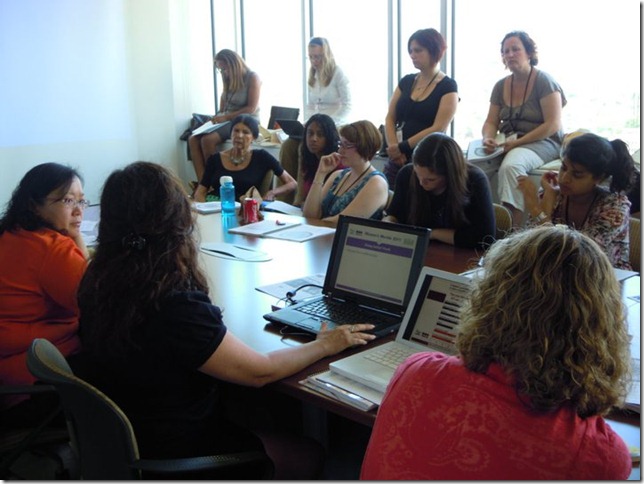
Advocacy – A Strategy of Empowerment
The overwhelming statistics relating to violence against women is evidence of the social and political inequality that women experience. Power and control are understood to be at root of violence against women, empowerment of NSRIW survivors is at the heart of intervention and sharing power through advocacy at the centre of any intervention.
At the core of the concept of empowerment is the idea of power. Power is often understood and related to our ability to have influence over people, regardless of their own desires or wishes. Through our work at Battered Women’s Support Services we have found that empowerment as a process of change has been effective.
As another participant, a researcher from Taiwan, commented: “I got a lot of information and I have become aware that the dynamics of abuse are the same everywhere, but I have just learned more effective ways to support women who experienced abuse. Advocacy is the key as a strategy of empowerment”
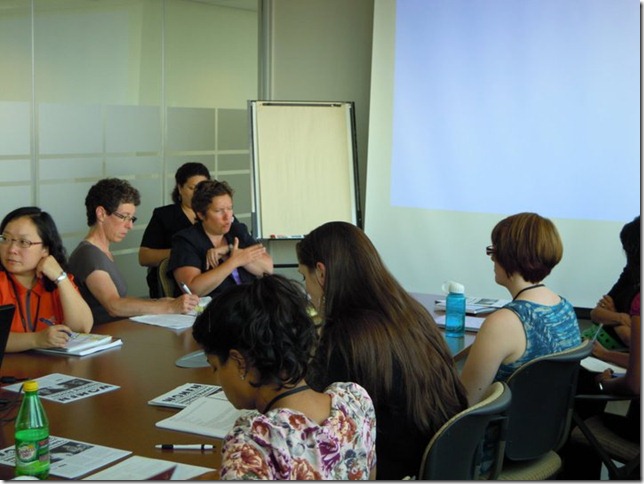
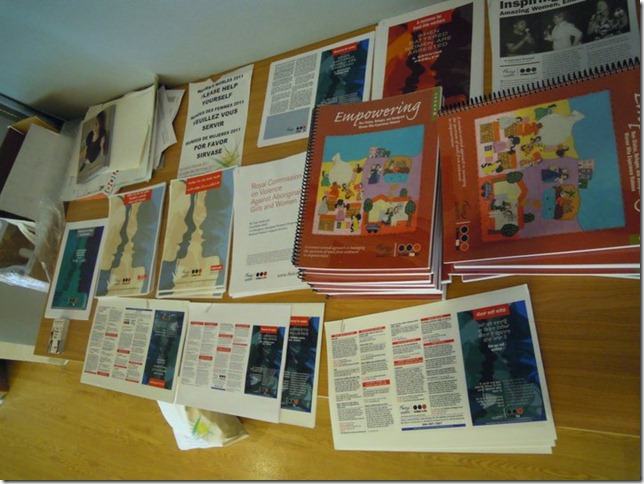
Participants had access to our print resources that synthesize theory and practice. As one woman said: “I am an Executive Director at a transition house in Toronto and I already had loads of information about the issues affecting NSRIW; however, these resources would be extremely helpful for my staff and I’ll readily be sharing them with all our staff.”
Here’s the online version of Empowering Non-Status, Refugee and Immigrant Women Who Experience Violence, Women Making Waves Publication, and a few other relevant Battered Women’s Support Services Resources and Publications .
Finally, one of our youngest participants, whose mother had worked at a transition house, commented on how appreciative she was of being part of the workshop and receiving the information, which she plans to bring to her mother, while re-emphasizing what we had shared regarding how “abuse is not cultural, patriarchy is, and we must stop using culture as an excuse and explanation for abuse.”
We have promised at least one more instalment of our blog series for Women’s Worlds 2011…it will be done some how, some way…
Battered Women’s Support Services is grateful for the financial support of Women’s World 2011 and The Law Foundation of BC for making our appearance at Women’s Worlds 2011 possible.
Apr 23, 2011 | Battered Women's Support Services, Immigrant Women
A Journey to Freedom: Supporting Refugee Women Who Are Dealing with Violence
By Rosa Elena Arteaga, Manager, Direct Services & Programs
At BWSS we have been supporting a number of refugee women who have experienced violence and who are going through their refugee process. During the last twelve months a high percentage of the women who accessed our services and who were going through their refugee process had their claims accepted.
It has been a long journey for the women to reach an official answer that acknowledges that they have the right to protection and freedom from abuse. Each woman has a journey that stems from their strength to escape from their abusive partners, from their country of origin, to the strength to come to an unknown country with the only hope to finally become free from violence. However, at their arrival, they had to face a system that does not understand violence against women and its effects as well as a system that does not understand the migration of abuse across the lifecycle, which follows girls and women through infancy, childhood, adolescence, adulthood, and as elders.
What did it take for the women to succeed with their claim for freedom? For some of them, it took the support from a family member, a friend, or a neighbour who helped them to escape to Canada. In Canada, it took the support of an anti-violence women’s organization, BWSS, which assisted them to access the right lawyer, the right interpreter, and the right counsellor. BWSS team supported each by identifying and understanding the range of needs from forced migration, sexual violence, and intimate violence to the spectrum of cultural needs. It took an approach which identifies the strength, barriers, needs and support needed from settlement to empowerment.
It took the consistency and commitment of the BWSS team to support each woman’s journey through its programming such as legal advocacy, Stopping The Violence counselling, language specific support groups, and employment program. For the majority of the women their refugee process took more than a year and during that year they were consistently accessing BWSS programs. In addition, it took the willingness of their immigration lawyers to learn and understand about the impacts of abuse. The lawyers became aware that women’s lost of memory, lack of trust, and their overwhelming fear does not relate to their intellectual capacity, cultural background or the veracity of their story, rather it relates to the impact of the violence that they have experienced though their whole life.
Finally, it took the women’s strength and resilience to escape from violence, to expose themselves to strangers and tell their stories, their consistency in contacting their friends, neighbours, family, women’s organizations in their countries of origin so they could gather evidence and expose that gender violence is a social issue and that women’s right to protection is not merely granted.
After a long and painful journey each woman has identified her unique strength, her value, her success and her right to live free from violence. We at BWSS stand and work in solidarity with all women who are on a journey to freedom.

